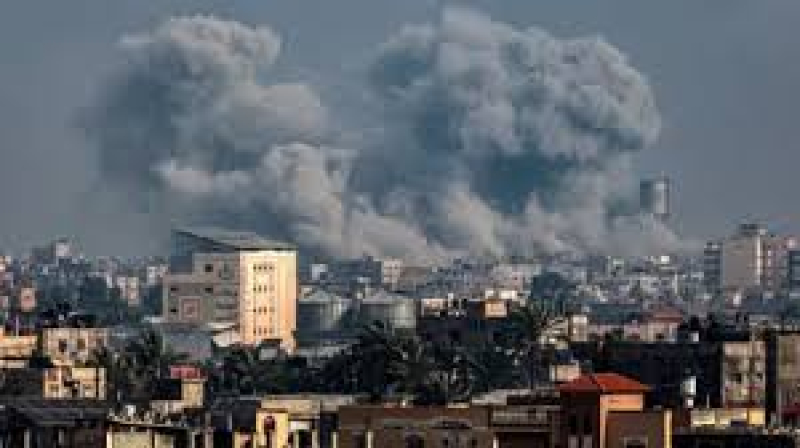- Lab Tests Find 67% Adulteration in Branded Milk Powder |
- DNCC Sets New House Rent Rules, Eases Burden for Tenants |
- RAB Officer Killed, Three Injured in Sitakunda Attack |
- Bangladesh Plans Padma Barrage, First Phase at Tk34,608cr |
- US Expands Trump’s Gaza Peace Board, Invites More States |
Israeli strikes in south Gaza city as hostages sent medicine

Residents of Khan Younis in southern Gaza say they have faced one of the most intense nights of air strikes since the start of Israel's offensive.
Videos showed flames light up the sky as the sounds of Israeli bombings and gunfire reverberated across the city.
Displaced families have been fleeing a local hospital as fighting closes in.
Meanwhile, medicines are being sent for Israeli hostages held by Hamas in exchange for more aid for Palestinian civilians under a Qatar-mediated deal, reports BBC.
The White House says Qatar has also been overseeing "very serious, extensive discussions" about a possible new hostage release deal, which were joined by a US envoy.
"This is the loudest sound of armed clashes [between Israeli soldiers and Palestinian fighters] that I've ever heard," Yasser Zaqzouq, who has been sheltering at Nasser Hospital in Khan Younis with his family, told the BBC.
"This is the first time we saw such scenes [of air strikes]. We were in terror. All the kids were screaming and crying."
A local journalist, Tariq Dahlan, said: "There is a state of panic among the displaced people in the hospital."
"People are running away from this area towards the West, but nobody knows where they're going and what his fate will be."
Israeli tanks were said to be just metres from the hospital.
A woman in southern Gaza, who did not wish to be named, said children could not sleep "because of the sounds of missiles".
"We are living in fear and terror," she said told the BBC, adding that many of the children had begun to wet themselves out of fear.
On Wednesday the Jordanian army said its military field hospital in Khan Younis had been badly damaged as a result of Israeli shelling in the area. The Jordanian army said it held Israel responsible for a "flagrant breach of international law".
The UN says that the war has displaced around 85% of Gaza's 2.3 million people, many of whom have been forced to cram into shelters and are struggling to get basic supplies.
In a joint statement, a number of UN special rapporteurs said: "Currently every single person in Gaza is hungry, a quarter of the population are starving and struggling to find food and drinkable water, and famine is imminent."
Israel's Defence Minister, Yoav Gallant, has said that the intense stage of Israel's military operations against Hamas would "soon" wind down in the south of Gaza, including Khan Younis, where it is thought local leaders of the armed group may be hiding.
He said that the military had already switched to more targeted action in the north, where it began its ground offensive.
However, in recent days, the return of Israeli tanks to parts of the north which ground forces had previously left has led some Gazans - who had been planning to return home - to think again.
Israeli military officials have repeatedly warned that the fighting will continue for months.
Qatar now says that medicines are being flown from Doha to El-Arish in northern Egypt to be transported to Gaza, as part of a deal it brokered between Israel and Hamas.
The plan had previously been announced but was apparently held up by logistical problems.
It is not clear how exactly the medicines will be delivered to some 45 of the remaining more than 100 Israeli hostages, who are reported to be suffering from chronic diseases or in need of other life-saving drugs.
The Israeli prime minister's office said "Qatari representatives in the Gaza Strip" would be involved and it is thought that the International Committee of the Red Cross may have a role.
The agreement is also said to involve a significant increase in medicines for Palestinians.
On Tuesday, the White House spokesman, John Kirby said Washington was "hopeful" that a new deal could soon be reached to free the hostages.
Both Qatar and Egypt, who are key mediators, have recently laid out plans that would see them released in exchange for a halt in fighting.

